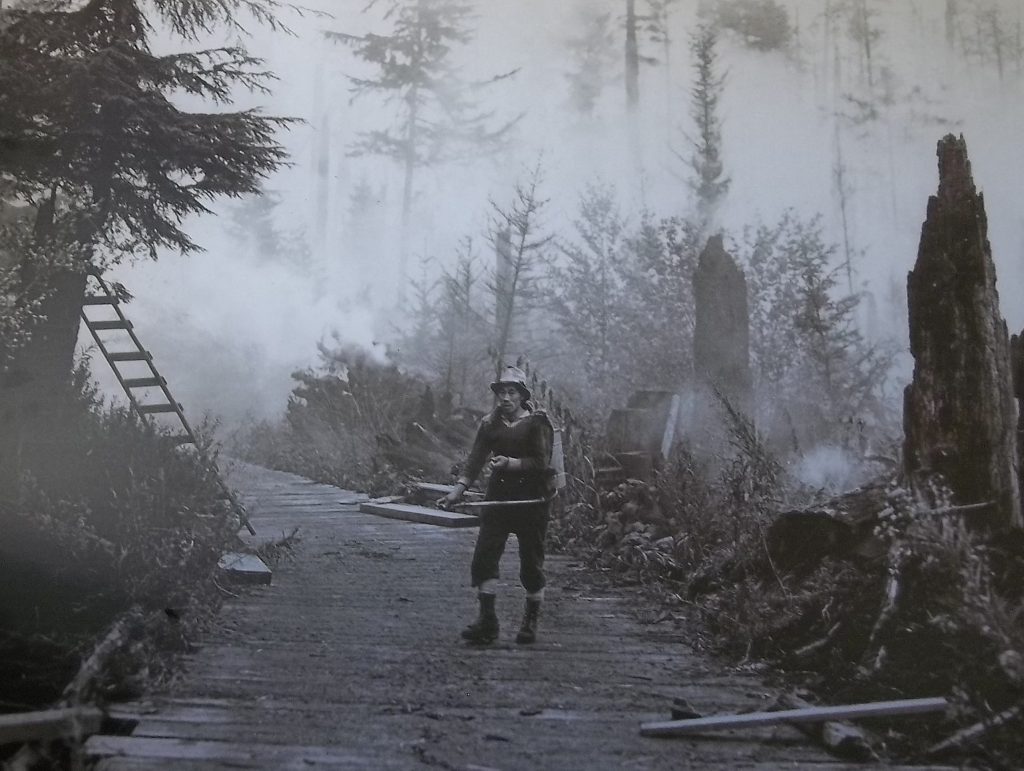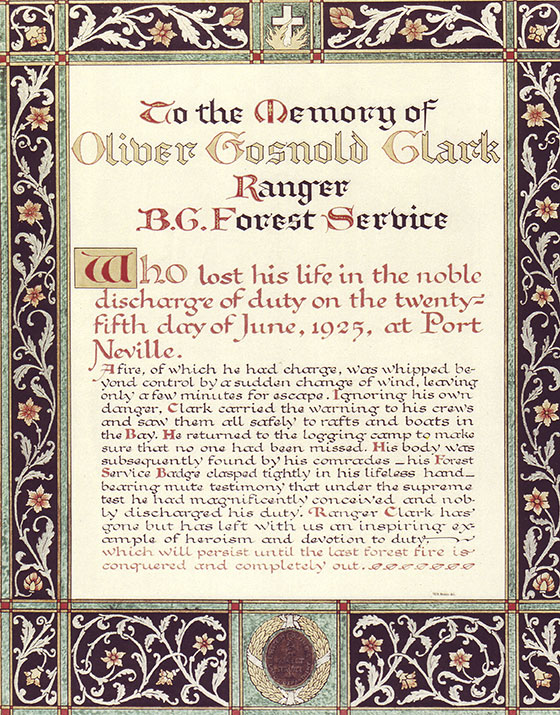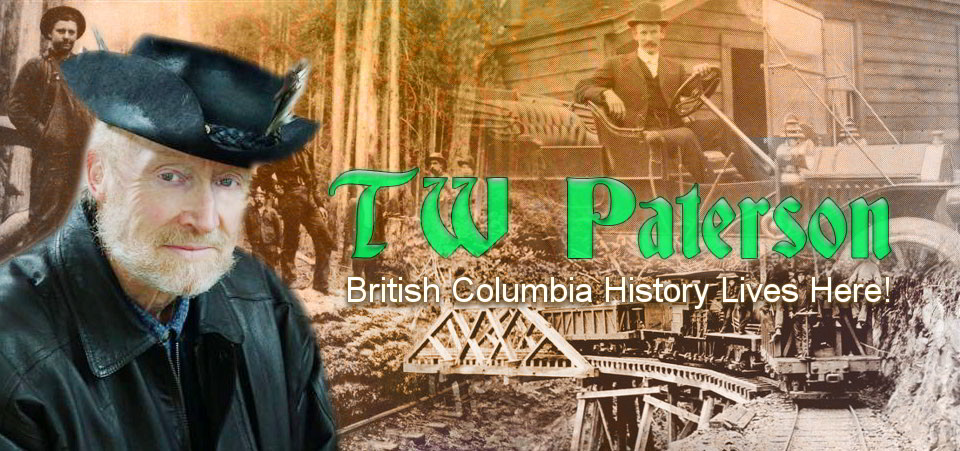Forest Ranger Oliver G. Clark Died in the Line of Duty

Although he served in the trenches in the First World War, it’s not for his military heroism that Oliver G. Clark is recognized.
Rather, his “deed of heroism unsurpassed in British annals,” as it was glowingly described at the time, occurred almost a decade after Armistice, and half a world away from the battlefields of Europe.
In possession of niece Lorna Clark when I originally wrote this piece for the Cowichan Valley Citizen in 1999, was the framed citation presented to the forest ranger’s family, almost a century ago. Awarded posthumously, it was the British Columbia government’s highest honour. (See footnote below.)
Late spring of 1925 had been unusually hot and tinder-dry, and B.C. forests faced a growing threat of fire. Outbreaks in the Qualicum, Ladysmith and Capilano areas soon spread out of control, that at Qualicum charring 1600 hectares (4000 acres) of trees, wildlife, bridges, logging camps and equipment.

From farther north came an even more alarming report, this one involving a fatality: “Fifty men are fighting a losing battle against a forest fire which threatened to drive them to the water at any moment at Hanson Logging Camp No. 3, Campbell River District. Relief gangs are snatching their brief periods of rest on booms far out in the water.
“According to the story told by the men of Hanson’s Logging Camp No. 4, Camp 4 was destroyed by fire Wednesday. Oliver G. Clark, forest ranger, was burned to death in this blaze, and the entire equipment was destroyed.”
Two days later all fires were under control and it was reported that a search party had recovered the body of the 35-year-old Deep Cove bachelor. A veteran who’d served overseas with the 88th Battalion, Clark was serving his second season as a fire ranger in the Campbell River area when killed.
Four months after his funeral, said to one of the largest and most impressive held in North Saanich, Premier john Oliver, members of the legislature, prominent leaders of the lumber industry and members of the provincial forestry department unveiled a plaque to Clark’s memory. The Provincial Library also displayed his photo and a memorial scroll, “there to remain so long as the building shall stand”.
It’s a copy of this citation that his niece Lorna Clark so prized in 1999 when she shared it with me and my readers of the Chronicles.
It reads: “To the memory of Oliver Gosnold Clark, Ranger, B.C. Forest Service, who lost his life in the noble discharge of duty, on the 25th day of June, 1925, at Port Neville.
“A fire of which he had charge, was whipped beyond control by a sudden change of wind, leaving only a few minutes for escape. Ignoring his own danger, Clark carried the warning to his crews and saw them all safely to rafts and boats in the Bay. He returned to the logging camp to make sure that no one had been missed. His body was subsequently found by his comrades—his Forest Service badge clasped tightly in his lifeless hand—bearing mute testimony that under the supreme test he had magnificently conceived and nobly discharged his duty.
“Ranger Clark has gone but has left us with an inspiring example of heroism and devotion to duty—which will persist until the last forest fire is conquered and completely out.”

Curiously, news accounts of the day gave few details of Clark’s death—more was said on his citation. Government records reveal that the tragedy began with an outbreak near Port Neville. Initial efforts seemed to contain the blaze but a sudden change of wind sent it careening towards the small coastal community. Ranger Clark ordered the women and children to head to the beach where he had a launch waiting.
By this time the fire had reached the town and Clark, concerned that not everyone had made it to safety, ran back to check even as flaming trees fell around him. Unaware that he’d done so, the refugees put to sea. Upon their realizing that he was missing, it was too late to help him and it was hours before they found his body, just six feet from the water’s edge.
An editorial in the Root and Branch, official organ of the forestry service, stoutly denied sinister rumours that he’d been abandoned to his fate: “…Supervisor J. Thompson and Engineer Haley, who were upon the Forest Branch launch, clung for hours to the outskirts of that raging inferno at the immediate risk of their own lives, in the vain hope of saving Clark.
“Time and again their craft was actually afire, but still they stayed until all hope of rescuing Clark had fled and they were able to rescue only his body. Then, and not until then, did they leave the spot.”
Even before they named a Forest Service vessel after him, Ranger Oliver Clark, “that thoroughly efficient officer,” had become folklore. A fellow member of the Forest Service memorialized him in verse:
Choked and burnt in the fiery hell
He rushed to the water’s edge, and fell
And in his hand, so tightly clasped
We found his Badge of Service as if to say
‘I’ve done my duty.’
It’s thought that Clark hoped to protect his badge from the fire, that it might confirm his identity.
There’s a poignant footnote to Oliver G. Clark’s story. An assistant ranger at the time of his death, he was posthumously promoted to full Forest Ranger.
* * * * *

The province has since created a B.C. Firefighter Medal of Bravery to recognize British Columbia firefighters “who act without concern for their personal safety”. To be eligible for this medal recipients must be an active fire service personnel at the time of nomination. Nominations, after review by the office of the Fire Commissioner, are forwarded to the Bravery Award Committee for consideration and final recommendation to the minister of Justice.
* * * * *
Forest Ranger Oliver G. Clark was further honoured in 1925 by the launch of the B.C. Forest Service vessel, Oliver G. Clark, which, lovingly maintained, has long been a live-aboard pleasure and fishing vessel. Slightly renamed, the 65-foot Oliver Clark II made newspaper headlines in November 2015 with an account of how deck-hand Kevin Strait of Malcolm Island survived a “two-hour ordeal in ocean by hanging on to jerrycans”.
Strain was pitched into the sea when he and owner and Capt. Jeff Currie struck a rock near Judd Island off northeast Sointula Island, Campbell River. By clutching two floating, empty gasoline cans for flotation Strait was survived being thrown about in a series of whirlpools until he was rescued.
For a great human interest story about the good ship Oliver Clark Google http://oceanecology.ca/wp/2016/09/05/a-bit-of-history/ .
Other posts of interest
See also:
Great Forest Fire of August 1938 Spring Alert: Forest Fires Kill You'll Never Forget Fighting a Forest Fire Firsthand


Hello again Tw,
I have to comments on this article. The first one is the picture of the picture from 1938. The ladder on the tree intrigues me. Is it placed there so a person can get up the tree for a better look at their surroundings or for another purpose?
What really caught my interest is the purpose built plank road built to take vehicular traffic. This is not a walking path as we see in this day, but quite possible a way to get over a swampy area for access to a logging area or to a small town. Lots of work and lumber put into that road. Love it.
Can’t explain the ladder, Brian; can’t even tell you where the photo was taken. It was provided to me by the Forestry branch years ago.
I regret now that, on my 100s of visits to the Provincial Archives years ago, I didn’t know about Ranger Clark so didn’t look for his plaque. Cheers, TW